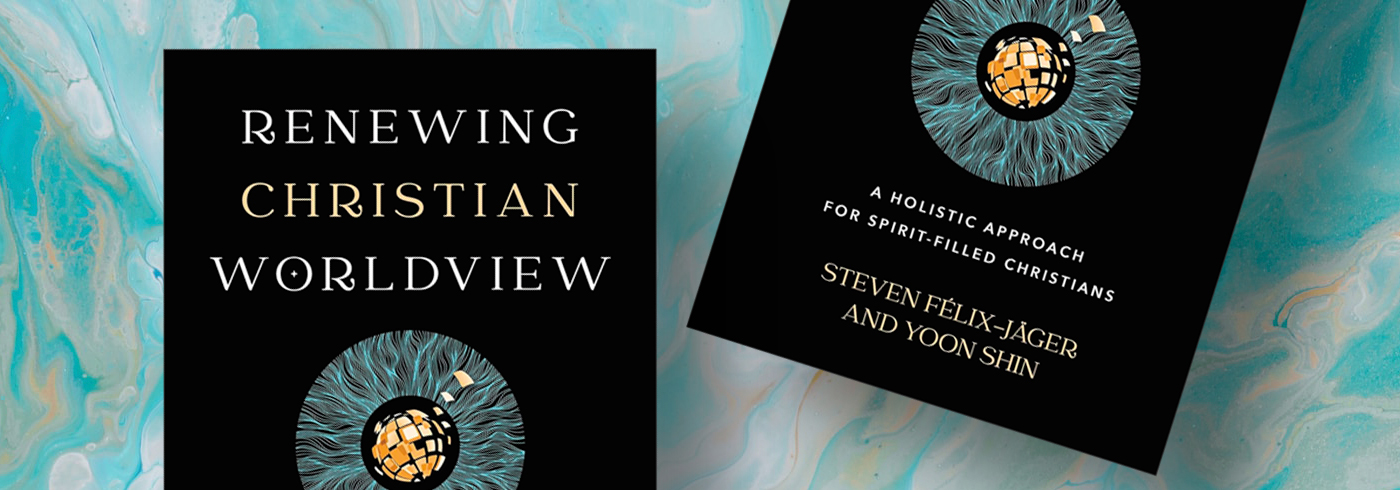Beauty, Goodness, Truth and Pentecost
Review of "Renewing Christian Worldview" by Steven Félix-Jäger and Yoon Shin
What does the Holy Spirit have to do with Christian worldview?
Read evangelical books on the topic, and the answer seems to be, “Not much.” The index to one bestselling textbook, now in its sixth edition, lacks any reference to the Spirit. Another, now in its second edition, discusses the Spirit at length only in defending the logic of the Trinity.
Pentecostals seem to give the same answer as evangelicals, but from the opposite direction. We talk about the Holy Spirit a lot. Baptism in the Spirit is power for ministry. The fruit of the Spirit is love. And the gifts of the Spirit are for edification. But we’re silent on worldview issues, leaving such intellectual matters to … evangelicals.
In Renewing Christian Worldview, Pentecostal scholars Steven Félix-Jäger and Yoon Shin offer a very different answer to the question:
We believe that the Spirit experientially guides us toward beauty, goodness, and truth — ultimately toward God’s own self as Beauty, Goodness, and Truth as such (what are known as the “transcendentals”) — and this is what makes for a renewed Christian worldview.
Several things about this statement, which summarizes the book, need unpacking.
First, Pentecostal audience. Throughout the book, the authors use the term “renewal tradition” in reference to every “Christian tradition that accentuates the Spirit’s renewing presence and work in the lives of believers.” Those traditions are their intended audience, comprising primarily the global Pentecostal and charismatic movements.
Among evangelical writers, Christian worldview is typically associated with truth claims. Beauty and goodness rarely enter the conversation. For Félix-Jäger and Shin, however, those transcendentals describe both the Creator and His creation, so the content of Christian worldview must take them all into account.
Second, pneumatological emphasis. As orthodox Christians, the authors believe God is a Trinity: One Being in Three Persons. Because the Acts 2 outpouring of the Holy Spirit plays an outsize role in the renewal tradition’s self-understanding, the authors emphasize the Spirit’s work in creating a holistic Christian worldview.
This does not imply the Father and the Son play no role in worldview formation. Rather, the renewal tradition simply elevates the experiential dimensions of the Spirit other Christian traditions have downplayed or overlooked in their emphasis on the intellectual dimensions.
Because of this, a renewal tradition receives elements of its worldview from other Christian traditions, even as it offers its elements to them. Consequently, while the book’s intended audience is Pentecostal, non-Pentecostal Christians can benefit from reading it as well.
Third, transcendental content. In philosophy, “transcendentals” are the constituent aspects of being, which include beauty, goodness and truth.
Among evangelical writers, Christian worldview is typically associated with truth claims. Beauty and goodness rarely enter the conversation. For Félix-Jäger and Shin, however, those transcendentals describe both the Creator and His creation, so the content of Christian worldview must take them all into account.
The bulk of the book is a detailed discussion of these transcendentals. Part 1 (“Renewing Beauty”) examines aesthetics, Part 2 (“Renewing Goodness”) ethics and civic engagement, and Part 3 (“Renewing Truth”) epistemology.
Fourth, triperspectival holism. If the objective content of Christian worldview is the transcendentals, then the formation of a Christian worldview in a believer “integrates the emotional (soul), the active (body), and the mental (mind),” as the authors put it.
This is an important point because people are embodied. We are not mere thinking machines or brains in a vat disassociated from the limitations of the body or the passions of the soul. We are feeling-doing-thinking beings.
Neither is there a hierarchy or order of operations among the soul, body and mind. We often think beliefs control our actions and emotions, but the reality is the three mutually affect one another. As the authors put it, “emotions and actions shape beliefs just as much as beliefs shape them.”
The apostle Paul offered a negative example of this in Romans 1:18 when he wrote about God’s judgment against people who “suppress the truth by their wickedness.” In verse 21, Paul added that such people’s “thinking became futile” because “they neither glorified him as God nor gave thanks to him.” In other words, wrong emotions and bad actions drove false beliefs.
One more thing: If I understand the authors correctly, they are not saying our soul aims at beauty, our body at goodness, and our mind at truth. Rather, they are saying all of these strive toward each transcendental.
The upshot, then, is that to have a Christian worldview, one must have an integrated personality, and the experience of the Spirit drives the formation of that whole self.
Renewing Christian Worldview is an important book by Pentecostal scholars. It examines basic worldview issues from an experientially Pentecostal point of view and in conversation with other Christian traditions and philosophical schools. Although written for use in academia, it will repay careful reading by ministers and interested laypeople.
Book Reviewed
Steven Félix-Jäger and Yoon Shin, Renewing Christian Worldview: A Holistic Approach for Spirit-Filled Christians (Grand Rapids, MI: Baker Academic, 2023).
Influence Magazine & The Healthy Church Network
© 2025 Assemblies of God

